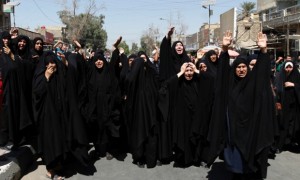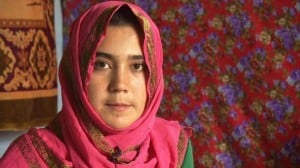Sudanese woman Amira Osman Hamed faces trial on September 19 for refusing to wear a headscarf.
Indian diarist and women’s rights activist Sushmita Banerjee has been killed in Afghanistan. Sushmita Banerjee was married to an Afghan man and recently moved back to Afghanistan, where she was said to be filming the lives of local women. Her book about her escape from the Taliban, published in 1995, became a bestseller in India.
According to a research by the Muslim Women’s Network UK Asian girls, including Muslims, are the hidden victims of British child grooming gangs; Asian girls are reported to be more reluctant to report abuse due to various reasons, including the fear of not being believed by the authorities.
It is reported that an 8-year-old Yemeni girl has died of internal bleeding on her wedding night.

Al Jazeera reports on the all-female rebel force Our Mother Aisha fighting in Aleppo, Syria.
Pregnant unmarried women in Iran face a difficult dilemma: either giving birth to a child without a legal status in the country or undergoing an (often illegal) abortion that could risk their future fertility and life.
A Tajik woman has been arrested in Tajikistan for allegedly recruiting men to fight with jihadist groups in Afghanistan.
A Pakistani man has been arrested for drowning his one-and-a-half year old daughter, allegedly because he wanted a son.
A German court has ruled that Muslim girls must take part in mixed-gender swimming classes in school, provided that they are allowed to wear full-body swimsuits.
The Canadian province of Quebec has recently proposed a Charter of Quebec Values, which would ban anyone working in the public sector, including doctors, teachers, and civil servants, from wearing “ostentatious” religious symbols, including headscarves.
Afghan MP Fariba Karkar and her children have been released by the Taliban; they were abducted on August 14 and said to be in good health.
Many Egyptian women felt that they were oppressed by the Muslim Brotherhood, and now they support the military regime without questions.
The Guardian features the story of 86-year-old Somali Faduma Ali and her struggle to stop female circumcision in her own family.
Mosques in Wuzhong, Ningxia Hui autonomous region, China, are educating local Muslims on reproductive health and provide free medical examinations for women. Female imams in particular have played a very important role in the project.
An American judge has ruled that clothing company Abercrombie & Fitch wrongly fired a Muslim woman who wanted to wear the headscarf on the job. The woman, Hani Khan, hopes that this will lead to changes in the company’s policy.
Qantara.de features an article on the book Gaddafi’s Harem by Annick Cojean, which features the story of Soraya, who was kidnapped when she was 15 by Gaddafi’s men and was detained for 3 years, during which was repeatedly raped, abused and humiliated by Gaddafi.
Female car mechanics in Senegal have opened their own car workshop in the capital, Dakar; even though they still employ some men, they hope to solely depend on female staff soon.
Malaysia’s Women, Family and Community Development Ministry calls on all women to report companies discriminating against women who wear the headscarf (or tudung) after a local Muslim woman shared her experiences of not being hired by several companies based on her headgear online.
Women’s E-News features an article on how femininity is used to punish and humiliate men in the Middle East.
Last month Meremnisa Turdi, a struggling Uyghur wife of a missing person, received a cash gift from well wishers from the USA for the Eid festival. Soon after she received the gift, the sum was taken from her by the Chinese police, threatening that she would be considered a criminal if she kept the 495 US dollars.
Many married women in Gaza face some form of domestic violence, but the resources to help these women are few and far between.
The Guardian profiles Senegal’s new prime minister Aminata Touré, who has a successful track record in fighting corrupting as the former Minister of Justice and is known for being an outspoken feminist.
The Afghan film Icy Sun aims to break the taboo surrounding rape in the country, but due to a short scene of limited nudity, the film is struggling to be accepted in Afghanistan’s conservative society.
The British Parliament discussed a possible ban on wearing face veils in public.
Modern coffee shops, where both men and women are welcome, have become increasingly popular in Yemen, but they exclude the poor and conservative majority of Yemeni society.
Next week Indonesia’s capital Jakarta will hold the Miss Muslimah World 2013 competition, as a response to the controversial Miss World Pageant. Twenty women from six nations (Indonesia, Brunei, Malaysia, Bangladesh, Iran and Nigeria) are said to compete.
A Wal-Mart employee in the USA has been fired, after he posted an image of a Muslim woman shopping at the store with a derogatory comment on Facebook.
At the beginning of this school year the hijab has been banned from public schools in Russia, but in a remote Siberian village girls continued to wear the hijab to school; prosecutors have now demanded that the girls remove their headscarves in class.
The Independent features an article on female polio vaccination workers in Pakistan.
Birmingham Metropolitan College in Birmingham, UK has banned all staff, students and visitors from wearing a face covering while on school premises.












